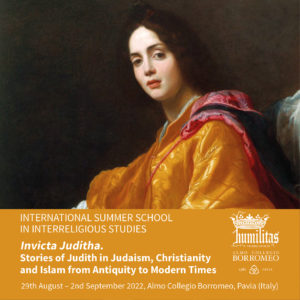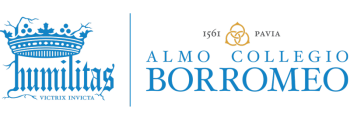07 Lug Invicta Juditha
 Invicta Juditha.
Invicta Juditha.
Stories of Judith in Judaism, Christianity and Islam from Antiquity to Modern Times
INTERNATIONAL SUMMER SCHOOL IN INTERRELIGIOUS STUDIES
29th August – 2nd September 2022
Almo Collegio Borromeo, Pavia (Italy)
The Book of Judith – which narrates the rescue of Judea at the beginning of the sixth century BC by the widow Judith, who is said to have managed to behead Holofernes, general of the Assyrian army – is considered apocryphal by orthodox Judaism and the Lutheran Bible. However, more than a millennium after the composition of the Book, the figure of Judith emerges strongly in a series of Jewish literary genres and religious practices of the Middle Ages. In the collective imagination she is particularly linked to Chanukah, the o-called ‘Jewish Christmas’, appearing triumphant, with the head of Holofernes in her hands, in the menorot, the six-branched candelabra with seven braziers. The Jewish tradition was intertwined with the late antique and medieval Christian tradition, both Catholic and Orthodox, which instead accepted the Book of Judith into the canon of the Bible. The reaction against the enemy, the legitimate use of force that challenges unjust human authority to restore justice, together with the feminine gender of the protagonist of a gesture of justice and emancipation, were the main hermeneutical keys.
Judith is also one of the most popular figures in Christian iconography. Although Judith is not mentioned in the Qur’an, where the only female name explicitly evoked is that of Mary, the presence of women in the Prophet’s circle and in the post- Koranic tradition is nevertheless at the centre of new studies and fresh research interests.
The Centro di Studi Interreligiosi based at the Almo Collegio Borromeo (Pavia, Italy) is organising an international summer school on this topic from 29 August to 2 September 2022 in Pavia.
The summer school will discuss, in close interaction between lectures and workshops with source readings, the presence of Judith in Hebrew texts from late antiquity to the modern age, in medieval and sixteenth-century Christian historical and literary texts, and in early modern Catholic and Counter-Reformation images. In the last part, it will focus on heroic female figures in medieval and modern Islamic
literature and in cinema from the contemporary Arab world.
There will also be a brief introduction to the presence of Judith in the history of (Western) music. The conference working languages are English and Italian, exceptionally French, with the aid of English translations for written sources.
INVITED SPEAKERS
Maurizio BUSCA – Ulisse CECINI – Chiara FRANCESCHINI
Deborah GERA – Helen GEYER – Matthias MORGENSTERN
Friederike PANNEWICK – Maria Cristina TERZAGHI
Margarete ZIMMERMANN.
SCIENTIFIC COMMITTEE
Lejla DEMIRI (University of Tu?bingen)
Thomas FRANK (University of Pavia)
Francesco MORES (University of Milan)
Matthias MORGENSTERN (University of Tu?bingen)
Daniela RANDO (University of Pavia)
Davide SCOTTO (University of Naples L’Orientale)
CONTACTS
For any question please write to the coordinators:
Daniela RANDO – daniela.rando@unipv.it
Thomas FRANK – thomas.frank@unipv.it
or to the Project Manager:
Sara BRITTI – sara.britti01@
